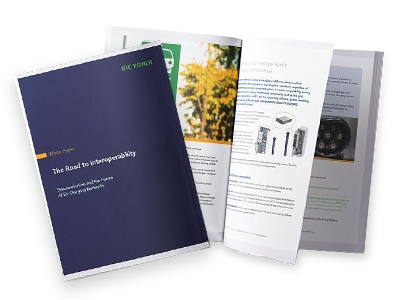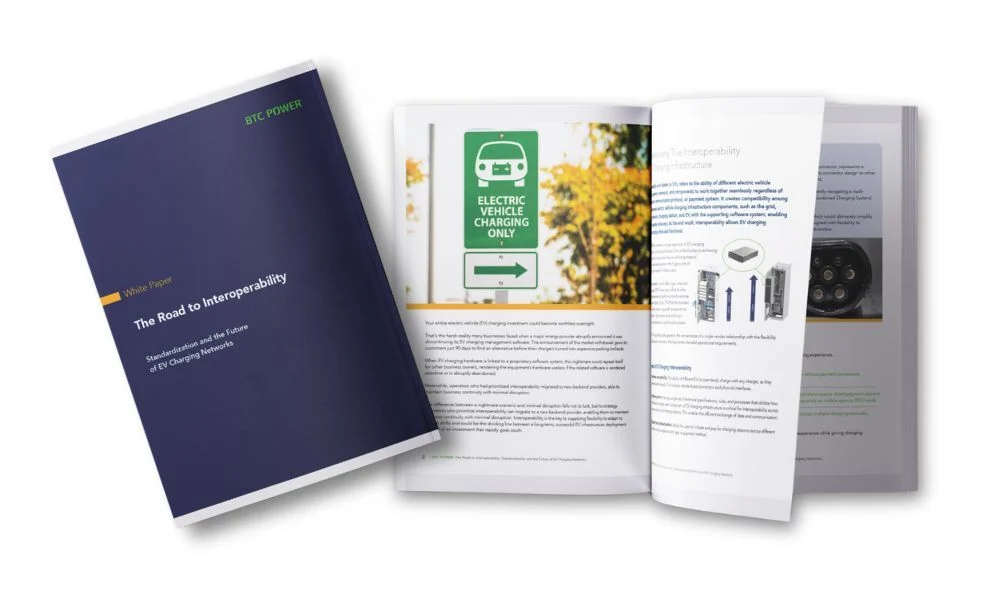
Could your EV charging investment become worthless overnight? Without proper interoperability, the answer might be yes.
Consider this recent scenario: When a major energy provider abruptly discontinued its EV charging management software last year, businesses were given just 90 days to find alternatives before their charging stations became nothing more than expensive parking bollards. This cautionary tale underscores a critical vulnerability in today’s rapidly expanding EV infrastructure market: the lack of true interoperability.
For charging station operators who had prioritized interoperability in their initial deployments, this market disruption represented a manageable transition. For others, it meant significant financial losses and business disruption. The difference wasn’t luck — it was strategy.
What is true EV charger interoperability?
At its core, interoperability in EV charging refers to the ability of different systems, networks, and components to work together seamlessly, regardless of manufacturer, communication protocol, or payment system. It ensures compatibility among the fundamental components of EV charging infrastructure:
- Hardware compatibility across different vehicles and charging stations
- Software systems with standardized technical specifications
- Payment and authentication processes that work across networks
- Communication protocols like OCPP 2.0.1 and ISO 15118
- Roaming capabilities for a seamless user experience

White Paper
The Road to Interoperability: Standardization and the Future of EV Charging Networks
Get the full white paper for more insight on EV charger interoperability.
BTC POWER’s approach to interoperability stands apart in the industry — turnkey yet tailored. Unlike competitors offering rigid, one-size-fits-all packages, BTCP delivers an integrated experience while customizing each component to meet operators’ unique needs.
The business imperatives for EV charger interoperability
Beyond the obvious risk of stranded assets when vendors exit the market, proprietary systems create ongoing competitive disadvantages. Non-interoperable charging stations limit your ability to:
- Adopt emerging technologies without complete equipment replacement
- Deliver seamless customer experiences across charging sessions
- Participate in evolving grid services and energy management programs
- Access expanding incentive programs requiring standards compliance
As the EV market matures, the advantage increasingly belongs to property owners offering flexible, future-proof systems that evolve alongside rapidly changing vehicle technologies and user preferences.

Need help with purchase to installation?
No problem! We understand the challenge of arranging multiple vendors. Let us help you by providing the names of partners for each step of the way
Key standards reshaping the industry
Two critical developments are transforming EV charging interoperability:
- OCPP 2.0.1: This latest version of the Open Charge Point Protocol incorporates enhanced security features, firmware management capabilities, and smart charging functionalities. Its recent approval as an IEC standard (IEC63584) marks a significant milestone for the industry, with certification increasingly becoming a requirement for grant eligibility.
- NACS (North American Charging Standard): Following Tesla’s decision to open its connector design, major automakers have announced plans to adopt this standard, creating both challenges and opportunities for charging providers navigating a multi-connector environment.
The power of flexible EV charger payment integration
Fragmented payment systems have long been a pain point in the EV charging experience. Emerging standards now address this through open payment protocols, credit card reader requirements on public stations, and cross-network roaming agreements. These advances dramatically improve user experience while giving operators greater financial flexibility.
When locations need to enhance their amenities while avoiding vendor lock-in, it turned to an interoperable solution. A recent installation at an airport demonstrated the power of interoperability. Four 180kW DC fast chargers manufactured by BTC POWER showcase multilevel interoperability:
- Hardware-to-software communication through OCPP 2.0.1 certification
- Multi-vendor compatibility across specialized components
- Future flexibility through adherence to open standards
The result? A state-of-the-art charging experience that maintains the freedom to adapt as technology evolves. The solar canopy-covered installation not only provides weather protection for users but also enhances the airport’s sustainability profile. With high-speed charging capabilities, the system effectively serves both frequent travelers and the growing number of EV drivers in the community
Future-proofing your EV charging investment
As the industry continues to mature, several emerging trends will extend interoperability requirements:
- Advanced grid integration through demand response and renewable energy optimization
- Autonomous charging solutions requiring new physical and communication standards
- Virtual power plant capabilities aggregating charging stations as flexible grid resources
BTC POWER: Setting the interoperability standard
With over two decades of experience and OCPP 2.0.1 certification, BTC POWER brings unparalleled expertise to the interoperability challenge. As the leading EV charger manufacturer, BTCP’s backend-agnostic approach includes successful integrations with over 50 providers, extensive vehicle compatibility testing, and specialized migration support services for customers affected by market consolidation.

Download our complete white paper, “The Road to Interoperability: Standardization and the Future of EV Charging Networks,” to learn how implementing an interoperability strategy can protect your EV charging investments and position your business for long-term success in the evolving EV landscape.

